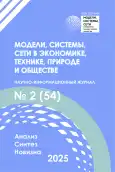ANALYSIS OF THE ISSUES OF INCREASING THE EFFICIENCY OF PROJECT ACTIVITIES AT ENTERPRISES OF THE MILITARY-INDUSTRIAL COMPLEX
- Authors: Pechalin N.D.1
-
Affiliations:
- Central Scientific Research Radio Engineering Institute named after Academician A.I. Berg
- Issue: No 2 (2025)
- Pages: 134-146
- Section: MODELS, SYSTEMS, MECHANISMS IN THE TECHNIQUE
- URL: https://journal-vniispk.ru/2227-8486/article/view/307588
- DOI: https://doi.org/10.21685/2227-8486-2025-2-11
- ID: 307588
Cite item
Full Text
Abstract
Background. The relevance of this research is determined by the need to improve the methods of managing complex projects in the military-industrial complex in the face of modern challenges, including geopolitical instability, sanctions pressure and stricter requirements for the implementation of the state defense order. Under the current conditions, traditional approaches to managerial decision-making demonstrate insufficient effectiveness, due to the high degree of uncertainty and the multi-criteria nature of the tasks facing defense industry enterprises. The aim of the research is to develop a scientifically based decision support methodology for optimizing management processes at all stages of the life cycle of creating weapons and military equipment. Matherials and methods. The proposed approach is based on the integration of multicriteria analysis and discrete optimization methods into the decision support system (DSS), which provides comprehensive consideration of technological, resource and time constraints typical of defense industry projects. The methodological basis of the research consists of modern achievements in decision theory, including methods of multi-criteria optimization. Special attention is paid to the development and application of a discrete mathematical apparatus, in particular, the full search method for problems with a limited set of alternatives. The work also uses modern design techniques such as FMEA risk analysis, critical path methods and visualization of project data using Gantt charts. Results. The application of this approach in DSS makes it possible to take into account a set of constraints (resource, time, risk, and production) and find optimal management solutions at various stages of the life cycle of creating IWT samples. The full search method implemented within the framework of the DSS ensures the selection of the best corrective actions even under harsh conditions, which is confirmed by the example of the OCD stage, where the use of weighted estimates and data visualization (Gantt charts) allowed minimizing deviations from the schedule. The proposed methodology increases the validity of decision-making by formalizing the selection process, provides adaptability to changing conditions, and can be integrated into existing project management systems in the defense industry, contributing to their effectiveness. Conclusions. The prospects for further research are related to the integration of artificial intelligence and machine learning methods for predictive analytics in project management. Of particular interest is the development of adaptive decision support systems capable of working in real time and taking into account dynamically changing conditions for the implementation of projects in the military-industrial complex.
About the authors
Nikolay D. Pechalin
Central Scientific Research Radio Engineering Institute named after Academician A.I. Berg
Author for correspondence.
Email: npechalin@vk.com
Postgraduate student, senior engineer of the civil products department
(9 build., 20 Novaya Basmannaya street, Moscow, Russia)References
- Golyatkina L.I. Decision support systems: from Leibniz to artificial intelligence. Vestnik Gosudarstvennogo universiteta «Dubna». Seriya: Nauki o cheloveke i obshchestve = Bulletin of the Dubna State University. Series: Sciences of Man and Society. 2023;(1). (In Russ.)
- Kulikov A.V. Adaptive project management in changing market conditions. Vestnik nauki = Bulletin of Science. 2025;3(5):159–177. (In Russ.)
- Dopira R.V., Yagol'nikov D.V., Yanochkin I.E. A component-based approach to the design of weapons and military equipment. Voennaya mysl' = Military thought. 2023;(1):66–70. (In Russ.)
- Lektorovich S.V. Strategic management and planning in modern organizations: key aspects and methods. Innovatsii i investitsii = Innovation and investment. 2024;(4):176– 179. (In Russ.)
- Dobrova K.B. Improving strategic planning for the development of corporations of the Russian defense industry. MIR (Modernizatsiya. Innovatsiya. Razvitie) = THE WORLD (Modernization. Innovation. Development). 2016;7(2):23–27. (In Russ.)
- Arkhireev A.V. The genesis of the concept of efficiency. Structure, condition, evaluation. Kontekst i refleksiya: filosofiya o mire i cheloveke = Context and reflection: Philosophy about the world and man. 2023;12(10A):36–49. (In Russ.). doi: 10.34670/AR.2024.43.45.004
- Lababidi M.R., Kel'chevskaya N.R. Decision Support System (DSS) as a tool for effective management decision-making at industrial enterprises. Sbornik dokladov Mezhdunarodnoy konferentsii studentov i molodykh uchenykh (Ekaterinburg, 21–23 aprelya 2022 g.) = Collection of reports of the International Conference of Students and Young Scientists (Yekaterinburg, April 21–23, 2022). Ekaterinburg: UrFU, 2022:377–381. (In Russ.)
- Malikova D.M. Features of production organization in the defense-industrial complex of the Russian Federation at the present stage. Organizator proizvodstva = Production Organizer. 2018;26(1). (In Russ.)
- Movtyan B.A., Danilaev D.P. The role of the corporate center in increasing the efficiency of state defense order fulfillment by defense industry enterprises. Organizator proizvodstva = Organizator proizvodstva. 2018;26(3). (In Russ.)
- Kostin K.B., Shimko P.D., Sun Tsi. Improving the efficiency of corporate income management in the Russian Federation under the current conditions of sanctions restrictions. Ekonomicheskie otnosheniya = Economic relations. 2022;12(4):671–698. (In Russ.)
- Kiyamutdinova D.D., Bayanova A.A., Kiyamutdinova D.D. et al. The Gantt chart and its relevance. MERIDIAN. 2020;(4):96–98. (In Russ.)
Supplementary files





















